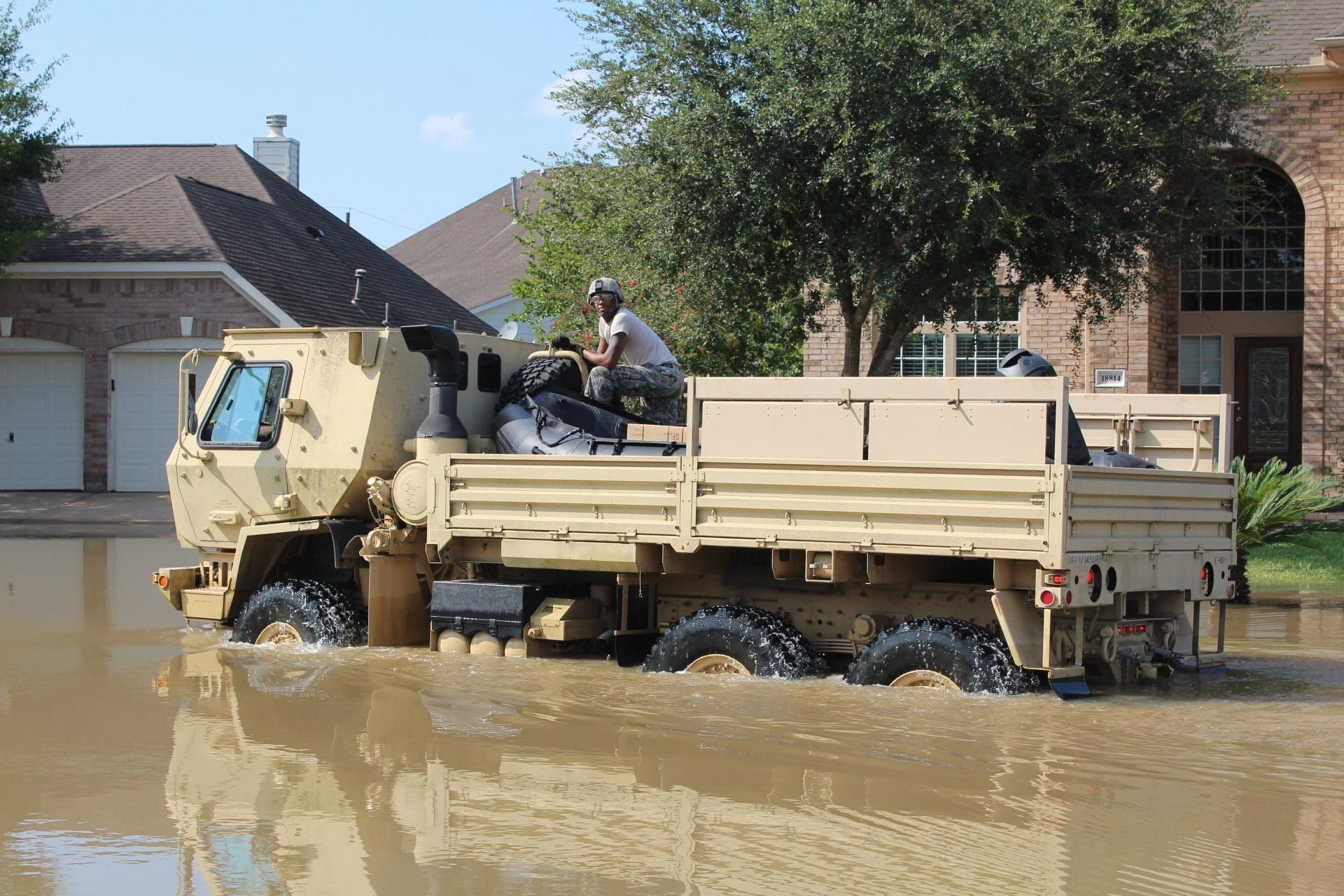The case for going to war against climate change
By Arnaud Boehmann | December 20, 2021
 Iraq sandstorm. Image by David Mark from Pixabay
Iraq sandstorm. Image by David Mark from Pixabay
When I became a climate activist in early 2019, I focused on issues at the forefront of popular discourse: coal, cars, air travel, agriculture, and construction. I also addressed shipping, because my hometown, Hamburg in the north of Germany, is home to one of Europe’s biggest ports. But as climate protests grew bigger, peaking at 1.4 million people in Germany alone in September that year, the discourse did not evolve at the same pace. The same basic facts are debated today; solution implementation is still just starting; and even the overdue COP26 climate conference in Glasgow did not bring about paradigmatic change.
As a security analyst accustomed to working with soldiers of various backgrounds, I find the security perspective to be widely absent from the discourse. The climate crisis is here, and security professionals like me now must fully grasp the extent to which we are affected by it, and what our role in solving it can be, because it directly intersects with our fundamental purpose.
Security, remember, is what this is all about. We are not protecting the climate. We are protecting ourselves.
The British military’s Climate Change and Sustainability Strategic Approach, published in March, and the US intelligence community reports released in late October offer a glimpse of how climate change will affect national security and what defense agencies must do in response. But even with this growing awareness, many security professionals are still moving too slowly on climate change. Its impacts on their work will be so profound that they cannot afford to start shifting gears only when politicians do so. They themselves must recognize the magnitude of the threat, advocate for adequate responses, and become agents of change.
I do not ask my colleagues—in or out of uniform—to join climate activists in the streets, though they are very welcome to do so. But security professionals must reframe today’s hand-waving about climate and treat it as a military-style threat that requires immediate and decisive action.

The climate-security connection. In 2020, when I saw US National Guard helicopters rescuing people from California wildfires and Australian Navy vessels conducting amphibious evacuations from bushfire-ravaged beaches, I began to link my perspective as a climate activist to my work and education in the security field.
Climate security as a subfield of security studies traces its origins back to the 1970s but received little recognition until after the end of the Cold War. That’s because the threat of nuclear annihilation dwarfed everything else.
Bulletin readers are, of course, familiar with the conventional wisdom that a conflict between two nuclear powers is the worst danger imaginable. Observers of the increasing tensions between China and the United States, including myself, tend to take every new warhead or submarine or strategic bomber very seriously, and we invest time and effort in getting the nuances right.
With China’s ever-increasing pressure on Taiwan, and a heated debate among Western scholars and politicians about whether or not defending Taiwan would justify it becoming a casus belli involving NATO, the Quadrilateral Security Dialogue (the United States, Australia, India, and Japan), the AUKUS trilateral security pact (Australia, the United Kingdom, and the United States), or any other constellation of forces opposed to China, the ultimate threat has returned and overshadows a much more concrete danger.
The dangers of a great-power war, real as they may be, remain hypothetical until the first shots are fired. The carbon levels in our atmosphere, on the other hand, grow day by day. They are closely watched but remain unchecked, not for lack of information but for lack of leadership and willpower. This is the dilemma of securitizing climate change—of making a security community that for the last 20 years fought a global war on terror and was busy watching China aware that it missed something big.
This year, again, has seen heat records shattered and widespread destruction caused by extreme weather. Humanity’s desperate clinging to every drop of fossil fuel not only increases the frequency and intensity of such tragedies, but also ensures larger ones to come.
Some laughed at Greta Thunberg when she used the metaphor of humanity’s house on fire. Some said she exaggerated. Few are laughing as communities from California to Siberia, from Turkey to Australia, helplessly watch fires devour everything in their path.
A military mentality. In 2020 Prince Charles said, “We must now put ourselves on a warlike footing, approaching our action from the perspective of a military-style campaign.” More recently, John Kerry, President Biden’s climate envoy, said the world needs a “wartime mentality” to fight climate change. They weren’t the first, but they are onto something.
Leaders could have reduced emissions while there was still time to limit global warming to the relatively safe level of 1.5 degrees Celsius above pre-industrial temperatures. Their negligence led us to today’s predicament: a civilization that cannot function without fossil fuels and the massive exploitation of nature, which in turn threaten the very existence of civilization.
Instead of succumbing to a feeling of helplessness, we need a different mindset. A military mentality that can make uncomfortable but strategic decisions—based on ends, ways, and means, for the security of us all—and that can deploy in an effective way the resources at our disposal is the sensible approach.
Some of the biggest investments in history were made for security purposes. To fight World War II, the United States, United Kingdom, Soviet Union, and their allies refocused their entire economies, because political leaders recognized that they were facing existential threats. Today the world once again faces existential threats, but political leaders have not yet stood up to the task. Multiple voices have called for a climate effort akin to the Manhattan Project. I believe that idea has failed because it suggests an escape route—a miraculous technology that might change everything and allow for continued delay on climate action. The value of the Manhattan Project analogy is that it underlines the magnitude of effort needed.
But for such a massive effort to be put in motion, state-level actors would need to treat climate change as a security issue—the same way they treat war. This can be done by rhetorical escalation that preempts “discourses of climate delay” and emphasizes the non-negotiability of the threat. Once established as a war-like threat, climate change can be addressed with the gravity, urgency, and resources it deserves.
The recent US National Intelligence Estimate on climate change, Defense Department climate risk analysis, Department of Homeland Security climate action plan, and special White House report on climate migration do not contain any spectacular new information, but they show that climate change has gained a new position in the current administration’s security considerations. Still, it is not yet being dealt with as a war-like threat.
Even under the Trump administration, the US Army took significant initiatives to securitize climate change, yet many current observers and actors within the field still focus on how climate change will affect the military’s traditional patterns of deployment. They ask: “How can a security apparatus prepare for increased migration?” or “Where does climate change create new vulnerabilities for our forces?” Few consider the role of the US, Chinese, and other armed forces as some of the world’s largest greenhouse gas emitters, and even fewer include the military as an actor expected to prevent global warming from exceeding the limits set by the Paris Agreement.
Reframing security. Globally, millions of men and women in the armed forces identify as security providers. With time running out and administrations proving to be bottlenecks, defense agencies must take the lead in reframing climate change as a security issue, a war-like threat that has already begun. Society must come to the point where the installation of a solar panel by an army technician is considered a security provision. This is not to replace civilian initiatives, but to complement them with the military’s powerful workforce, equipment, and strategic thinking. It is not to alienate soldiers from their role as fighters, but to give them an additional dimension required by circumstances.
To break it down: The question is not whether your tank needs better air conditioning, but what the military domain can do across the fields of research, development, logistics, intelligence, materiel, and personnel to increase the overall security of the population.
Security professionals cannot afford to dwell in climate denial. They must see climate change as a threat to the people, stability, prosperity, and territorial integrity of their countries. Many of the officers I’ve spoken with, from various nationalities and backgrounds, already understand the magnitude of the climate threat. It is difficult to maintain combat readiness when your helicopters are evacuating civilians from wildfires, your military installations are damaged by extreme weather, your army engineers are building bridges across flooded rivers, and your soldiers are shoveling sandbags to stop water, not bullets.
The resources currently being committed to maintaining and containing conflicts between great nations—which, not coincidentally, are also the biggest polluters—are the resources that are now required elsewhere to mitigate the climate crisis. Without them, we will not live to fight another day.
Together, we make the world safer.
The Bulletin elevates expert voices above the noise. But as an independent nonprofit organization, our operations depend on the support of readers like you. Help us continue to deliver quality journalism that holds leaders accountable. Your support of our work at any level is important. In return, we promise our coverage will be understandable, influential, vigilant, solution-oriented, and fair-minded. Together we can make a difference.
Keywords: military, security
Topics: Climate Change, Voices of Tomorrow
















I am a retired Systems Security Analyst who often consulted with the US DoD. I didn’t operate at the level of senior government officials but if I had them as clients, I would certainly advise them to be prepared. Civilians need to effect the changes and our political atmosphere is not tuned to the right frequencies to hear this kind of problem. I posted your article on FB. About all I can do.
Thanks for your insight. Any serious effort to address climate chaos must involve the most powerful forces in the world: the militaries and intelligence-security bodies of the richest countries. There is no other way.
Let’s reverse the catchy 60’s phrase, to “turn off, tune out, join in” from the original:” Turn on, tune in, drop out”.
We have to unplug. Soldiers need shepherds. Diplomacy must overwhelmingly dominate military strategy. The military must be subordinate, they must disarm, they must actively work to make themselves obsolete.
Diplomats and politicians must bring the public and the monied interests along. Time for the soldier to come home. Swords into ploughshares, and the highest return on investment must not be the imagined straw man of the enemy, waiting to annihilate us.
Money is the barrier. People would have to sacrifice. It’s easier to sacrifice to fight Hitler than to repair spaceship earth.